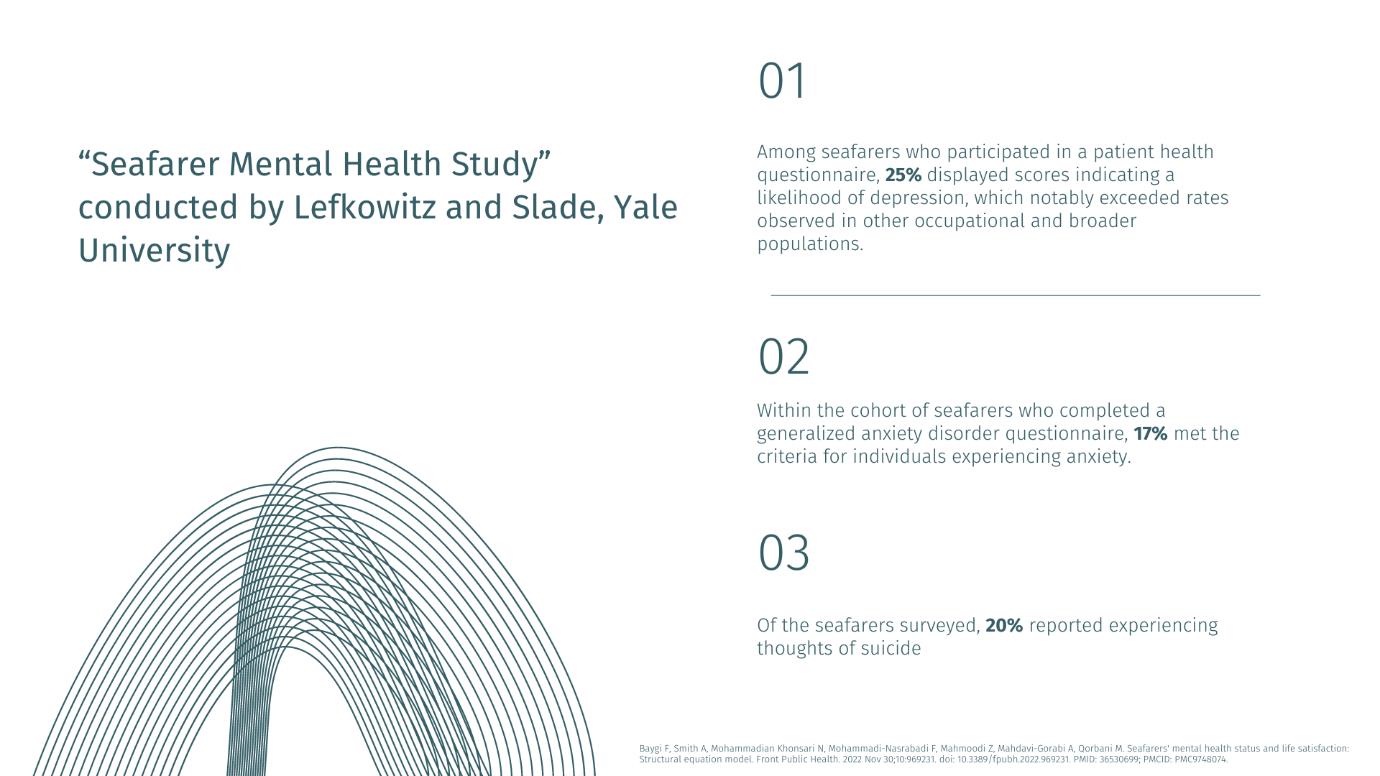The maritime industry is increasingly recognizing the importance of seafarers' mental health as a critical factor in ensuring safe and efficient operations at sea. Extended periods of isolation, high-stress environments, and demanding work schedules can all contribute to mental health challenges among seafarers.
Meanwhile, technological advancements have sparked a revolution that is transforming the way ships operate and crew members are assessed. Automation, driven by artificial intelligence (AI) and cutting-edge technologies, is reshaping the maritime landscape by enhancing safety, efficiency, and crew performance but also increasing the need for critical thinking, decision making and interpersonal skills.
Today, innovative crew assessment methodologies are helping ship operators select, train, and manage their crew with greater precision and effectiveness. To address this issue, the integration of artificial intelligence (AI) into mental health programs and assessments holds the promise of more accurate, timely, and comprehensive evaluations.
This article delves into the intertwined evolution of technology and crew assessment onboard, highlighting their contribution to the overall well-being of the seafarers.
THE MORE COMPLEX TECHNOLOGY, THE MORE SKILLED AND FITTED PERSONNEL NEEDED.
Semi Autonomous Ships and Assessment
Semi-autonomous ships represent a new frontier in maritime operations, blending traditional seafaring with advanced technology. As a result, the next generation of seafarers will be a hybrid breed, combining the expertise of maritime operations with advanced technical skills. Investing in training and development will be essential to ensure that crew members are well-equipped to meet these challenges.
In a groundbreaking study titled "Identifying Skills and Competencies Towards Building a Training Framework for Future Operators of Autonomous Ships," authored by Gholam Reza and Samrat Ghosh, the authors delve into the essential skills and competencies required to build a comprehensive training framework for operators of autonomous ships. Reza and Ghosh propose a systematic approach to developing a training framework that caters to the unique demands of autonomous ship operation. The framework encompasses: Technical proficiency, decision making skills, adaptability and learning, human-machine collaboration, and emergency handling.
Equally important is the need to train seafarers on soft skills, psychological readiness and effective communication since seafarers will continuously need to adapt to new systems and tools. Operating with automated systems might mean fewer crew members leading to feelings of isolation therefore, emotional resilience, stress management training and support services will be crucial to crew welfare. Smooth operations between shore based control centers will require effective communication skills to detect and communicate potential issues.
It is essential that the maritime industry recognizes the interdependence between job performance and mental health. Psychological conditions like generalized anxiety or depression have been associated with impairments in cognitive functions like attention, concentration, memory, decision making and problem solving; traits highly needed when working in a complex or demanding environment.
The Role of Artificial Intelligence in Mental Wellbeing
As the maritime industry embraces automation, crew assessment methods are evolving to ensure that crew members can efficiently operate, troubleshoot, and manage these advanced systems.
Here's how AI can leverage seafarers' mental health and wellbeing
- Data Analytics and Monitoring: AI-powered tools can analyze data collected from various sources, including wearable devices, social media activity, and communication patterns. These analyses can provide insights into seafarers' emotional states, stress levels, and potential mental health concerns.
- Natural Language Processing (NLP): NLP algorithms can be used to analyze written or spoken communication for emotional cues. Chatbots or virtual assistants equipped with NLP can engage in conversations with seafarers, identifying signs of distress and providing immediate support or flagging concerns.
- Predictive Analytics: By analyzing historical data and patterns, AI algorithms can predict when seafarers might be at a higher risk of experiencing mental health issues. This enables proactive interventions before problems escalate.
- Remote Psychological Assessments: AI-powered psychological assessment tools can be used remotely to gauge seafarers' mental health conditions. These tools can provide standardized assessments and recommendations without requiring physical presence. IMEQ is the first one in the industry to offer AI based mental health assessments to seafarers.
- Personalized Support: AI can tailor interventions and support based on an individual's mental health profile. This includes suggesting coping mechanisms, stress-relief activities, and access to relevant resources.
- Reduced Stigma: AI-driven assessments can provide a level of anonymity that might encourage seafarers to open up about their mental health struggles, reducing the stigma associated with seeking help.
Artificial intelligence has the potential to revolutionize seafarers' mental health assessment, making evaluations more accurate, timely, and comprehensive. By identifying mental health challenges early, providing personalized support, and reducing the stigma associated with seeking help, AI can contribute to the well-being of seafarers and the safety of maritime operations. However, the responsible and ethical deployment of AI tools, combined with a recognition of the irreplaceable role of human empathy and understanding, will be crucial in achieving this goal. As the maritime industry continues to adapt to technological advancements, integrating AI into mental health assessment is a step toward navigating the waters of well-being more efficiently.
Assessments include :
Pre-Employment Assessments: Shipping companies often conduct psychological evaluations as part of the pre-employment screening process. These assessments help identify candidates who have the psychological resilience and coping skills required to endure the isolated and demanding environment of maritime work.
Depression and Anxiety Screening: Given the isolated nature of maritime work, screening for conditions like depression and anxiety is essential. Early detection can lead to timely support and intervention.
Adaptability : Maritime work often involves being away from home and adapting to different cultures and environments. Psychological assessments may evaluate a candidate's adaptability and ability to cope with change.
Emotional Well-being: Assessments focus on assessing emotional stability and resilience. This includes evaluating a seafarer's ability to manage stress, anxiety, and isolation effectively.
Substance Abuse Screening: Assessments may include screening for substance abuse issues, as the isolated and stressful environment of a ship may contribute to such problems.
Fatigue and Sleep Assessments: Sleep is crucial for cognitive function and overall well-being. Assessments might involve evaluating a crew member's sleep patterns and potential sleep disorders.
Post-Traumatic Stress: For crew members who have experienced traumatic events at sea, psychological assessments can help identify potential post-traumatic stress symptoms and ensure appropriate support is provided.
Cognitive Assessments: Cognitive assessments gauge a seafarer's ability to perform critical tasks, make decisions under pressure, and maintain situational awareness. These assessments ensure that crew members are mentally equipped to handle their responsibilities effectively.
Communication Skills: Effective communication is vital on a ship. Assessments may evaluate a seafarer's interpersonal skills, teamwork abilities, and conflict resolution capabilities.
Personality Assessments: Provide insight about a person’s characters traits, temperament, motivational drives and behavioral tendencies and how these might interact with the work environment.
Resilience Training: In addition to assessments, some shipping companies offer resilience training programs. These programs equip crew members with coping strategies and mental health support resources.
Wellness Initiatives: Progressive shipping companies invest in wellness initiatives that promote mental health awareness and provide resources for crew members to manage stress and maintain mental well-being.
Revolutionizing Mental Health Assessment with AI Integration
At IMEQ, we advocate for businesses to prioritize their workforce over the mere pursuit of substituting human roles with machines. It's imperative to strike a balance between technology and human talent. Once individuals are adeptly trained to harness technology, a seamless synergy between man and machinery can be achieved. A critical component of this vision is preparing individuals for the automation age; hence, we are loyal supporters of comprehensive crew assessments.
We comprise a team of psychologists collaborating closely with Harvard University alumni. Our focus involves integrating artificial intelligence into mental health aspects within the maritime sector. We possess the expertise to address pertinent concerns related to mental health and its impact on occupational performance. Through our efforts, we've devised strategies, certifications, and training programs that prove valuable to ship-owning companies.
In September 2023 we launched the first ever on a world-wide scale, Predictive Model on Mental Health Fit with 98% accuracy. IMEQ's Cutting-Edge AI Integration using standardized testing and six AI models incorporated in the platform can predict if a candidate will exhibit mental health problems in the future.
CONCLUSION
Crew members play a vital role in the safe and smooth operation of vessels, making their psychological health and stability an imperative factor for maritime companies to address.. Psychological well-being not only affects individual crew members but also impacts team dynamics, decision-making processes, and overall vessel performance. identifying potential psychological issues early and addressing them appropriately, maritime companies can prevent accidents, mitigate human errors, and promote a positive working environment.
ABOUT IMEQ
IMEQ© was founded in 2016 with a mission to safeguard crew psychological health and safety, while decrease risk factors associated with poor employee psychological health and workplace safety. Our mission to creating resonant working environments for onboard employees and ashore personnel is consistent with our vision: “Happier Seafarers Safer Journeys”.
Our digital platform utilizes standardized and evidence based assessments, an advanced test flow process and machine learning algorithm (artificial intelligence), that provide objective data on psychological & personality traits, attitudes and skills to simplify the hiring process and improve job fit.
Image: Alexandra S. Kaloulis, Managing Director of Innovative Maritime Emotional Intelligence Cenrtre (I.M.E.Q.)
ELNAVI Newsletter
More Information: ELNAVI,
19, Aristidou str., Piraeus 185 31,
Tel.: +30 210 45.22.100, e-mail: This email address is being protected from spambots. You need JavaScript enabled to view it.







